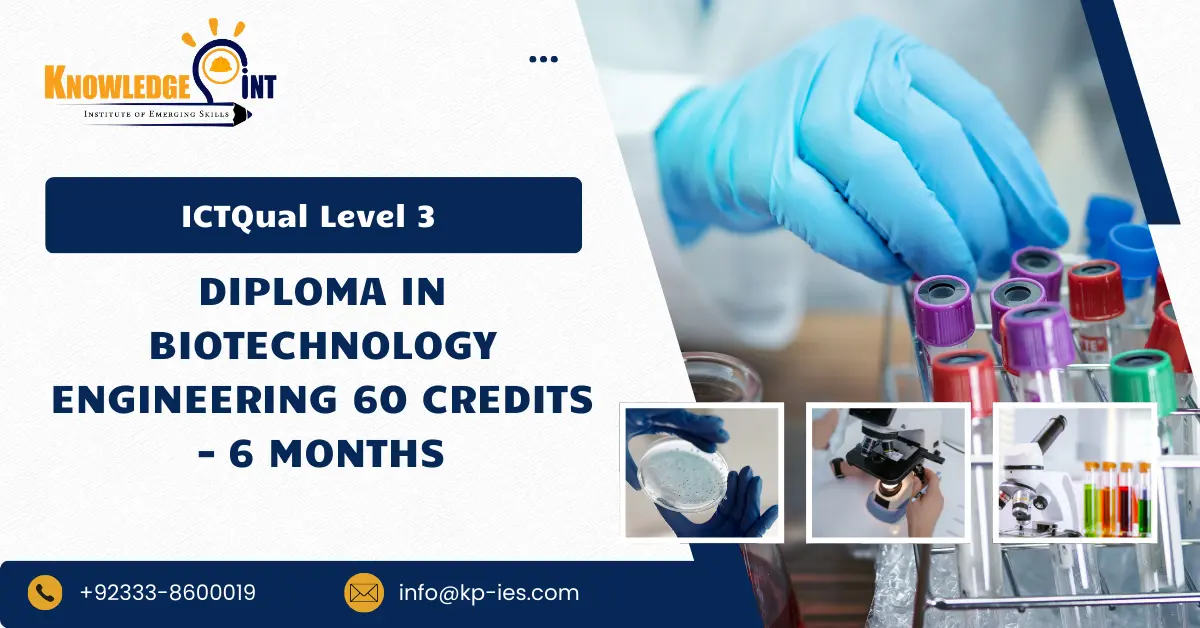The ICTQual Level 3 Diploma in Biotechnology Engineering is a dynamic qualification designed to provide students with a comprehensive understanding of the biotechnology sector, preparing them for various roles in the rapidly growing field. With a focus on developing practical skills, theoretical knowledge, and industry-relevant expertise, this 6-month course offers an excellent opportunity for those looking to begin or advance their career in biotechnology engineering.
The ICTQual Level 3 Diploma in Biotechnology Engineering is a 60-credit program that spans 6 months, offering a blend of practical and theoretical learning to ensure that students acquire essential skills in biotechnology. It’s suitable for individuals who want to work in fields such as genetic engineering, bioprocessing, pharmaceuticals, and environmental biotechnology. This diploma serves as an ideal stepping stone into the biotechnology industry, equipping students with the technical know-how, safety protocols, and ethical considerations required in real-world scenarios.
The ICTQual Level 3 Diploma in Biotechnology Engineering is an excellent choice for individuals looking to enter the biotechnology field quickly and effectively. With a comprehensive curriculum, hands-on experience, and an emphasis on ethical and safety standards, this course provides the knowledge and skills needed to succeed in the biotechnology industry. Whether you’re looking to start your career or continue your studies, this qualification offers a solid foundation for future growth and opportunities in one of the most exciting and rapidly expanding sectors.
Course Overview
The ICTQual Level 3 Diploma in Biotechnology Engineering 60 Credits – 6 Months consists of 6 mandatory units which are as follows.
- Introduction to Biotechnology and Engineering Principles
- Cell Biology and Molecular Genetics
- Bioprocessing and Bio-manufacturing Techniques
- Biotechnology Laboratory Techniques and Safety Protocols
- Genetic Engineering and Biotechnology Applications
- Biotechnology Project Management and Professionals
Learning Outcomes for ICTQual Level 3 Diploma in Biotechnology Engineering (60 Credits – 6 Months)
1. Introduction to Biotechnology Engineering
- Understand the core concepts and principles of biotechnology engineering.
- Identify key applications of biotechnology in various industries such as healthcare, agriculture, and environmental sustainability.
- Discuss the role of biotechnology in advancing technological innovations and solving global challenges.
2. Engineering Principles in Biotechnology
- Apply fundamental engineering principles to biotechnological processes and systems.
- Analyze the integration of engineering concepts in biotechnology projects, including bioprocessing and product development.
- Demonstrate knowledge of key technologies used in biotechnology engineering, such as genetic engineering and bio-manufacturing.
3. Health, Safety, and Ethical Considerations in Biotechnology Engineering
- Explain the importance of health and safety regulations in biotechnology environments.
- Assess ethical concerns in biotechnology research and applications, particularly with genetic engineering and environmental impacts.
- Apply safe laboratory practices and understand the ethical implications of working with biological systems and materials.
4. Biotechnology Applications in Healthcare and Industry
- Recognize and evaluate the applications of biotechnology in the healthcare sector, including drug development, diagnostics, and gene therapy.
- Identify biotechnology’s role in sustainable agriculture, food production, and environmental remediation.
- Explore biotechnological innovations that contribute to the pharmaceutical and biomedical industries.
5. Bioprocessing and Lab Techniques
- Understand the fundamental techniques used in biotechnology laboratories, such as cell culture, fermentation, and bioreactor operations.
- Gain practical skills in preparing and conducting experiments for bioprocessing applications.
- Interpret laboratory results and apply them to solve real-world biotechnological challenges.
6. Biotechnology Regulatory Frameworks and Standards
- Understand the key regulatory frameworks governing biotechnology, including health and safety laws and environmental regulations.
- Discuss the importance of maintaining compliance with industry standards, including Good Manufacturing Practices (GMP).
- Explore the role of regulatory bodies in overseeing biotechnological developments and applications.
7. Biotechnology Process Control and Optimization
- Analyze the biotechnological processes and apply principles of process control for optimization in industrial applications.
- Use tools to monitor and control parameters in biotechnological systems such as temperature, pH, and nutrient levels.
- Identify key performance indicators (KPIs) in biotechnological processes and implement solutions for improved efficiency.
8. Emerging Technologies in Biotechnology
- Investigate emerging trends and innovations in biotechnology, such as CRISPR gene editing, synthetic biology, and bioinformatics.
- Explore the potential impacts of these technologies on various industries, including healthcare, agriculture, and energy.
- Critically assess the future challenges and opportunities posed by cutting-edge biotechnological advancements.
9. Professional Practice in Biotechnology Engineering
- Demonstrate an understanding of the professional ethics and responsibilities of a biotechnology engineer.
- Develop effective communication skills to collaborate within multidisciplinary teams in biotechnological projects.
- Understand the career pathways within biotechnology engineering and develop skills for ongoing professional development.
The ICTQual Level 3 Diploma in Biotechnology Engineering (60 Credits – 6 Months) offers a range of benefits for individuals looking to advance their career in the rapidly evolving field of biotechnology. Here are the key course benefits:
1. Comprehensive Skill Development
- Hands-on Experience: The course provides practical knowledge of laboratory techniques, bioprocessing, and engineering principles essential for working in biotechnology.
- Technical Expertise: Students develop expertise in biotechnology applications, bioprocessing, and industry-standard lab techniques such as cell culture, fermentation, and bioreactor operations.
2. Industry-Relevant Knowledge
- Real-World Applications: The course focuses on biotechnology applications in healthcare, agriculture, and the environment, preparing students to solve real-world challenges.
- Emerging Technologies: Students gain insights into cutting-edge advancements such as gene editing (e.g., CRISPR), synthetic biology, and bioinformatics, making them well-equipped for the future of biotechnology.
3. Understanding Health, Safety, and Ethics
- Ethical Awareness: The course emphasizes the ethical considerations in biotechnology, such as the implications of genetic engineering and the responsible use of biotechnology in different industries.
- Health and Safety Compliance: Students learn about safety regulations and ethical standards, ensuring they are prepared to work safely and responsibly in a biotechnology environment.
4. Enhanced Career Opportunities
- Industry-Ready Skills: With a mix of technical, analytical, and practical skills, graduates are well-prepared to pursue careers in biotechnology engineering, research, product development, and more.
- Diverse Career Paths: Graduates can find employment in biotechnology, pharmaceutical companies, agricultural firms, environmental agencies, and healthcare institutions.
5. Foundation for Further Education
- Pathway to Advanced Qualifications: The diploma serves as a stepping stone for further studies, including specialized qualifications and higher education programs in biotechnology, bioengineering, and related fields.
- Graduate Programs: Students who complete the diploma can progress to undergraduate or postgraduate degrees in biotechnology, bioengineering, or biomedical sciences.
6. International Recognition
- Globally Recognized Certification: The ICTQual diploma is recognized internationally, providing students with opportunities to work and study in global biotechnology markets.
- Competitive Edge: This certification sets graduates apart in a competitive job market, demonstrating their expertise and commitment to professional development in biotechnology engineering.
7. Flexibility and Efficiency
- Short Duration: At just 6 months, the course offers a fast-track approach to gaining a solid foundation in biotechnology engineering, allowing students to enter the workforce or continue their education in a shorter timeframe.
- Flexible Learning Options: The program is designed to accommodate various learning preferences, with potential for online or blended learning options that fit around existing commitments.
8. Strong Industry Connections
- Networking Opportunities: Students have the chance to engage with industry professionals and participate in real-world projects, enhancing their career prospects.
- Professional Development: The course includes a focus on professional practice, helping students develop essential communication, teamwork, and leadership skills that are crucial in the biotechnology industry.
9. Personal Growth and Confidence
- Critical Thinking: Students develop the ability to critically analyze biotechnology problems, evaluate emerging technologies, and make informed decisions in a fast-evolving industry.
- Problem-Solving Skills: The course encourages problem-solving and innovation, giving students the confidence to tackle complex challenges in biotechnology engineering.
The ICTQual Level 3 Diploma in Biotechnology Engineering (60 Credits – 6 Months) offers significant future progression opportunities for students. Completing this diploma provides the foundation for further education and career advancement in the field of biotechnology and related industries. Below are the main pathways for future progression:
1. Further Education Opportunities
- Level 4 and Level 5 Diplomas: After completing the Level 3 Diploma, students can progress to higher-level qualifications, such as the ICTQual Level 4 or Level 5 Diploma in Biotechnology Engineering, where they can deepen their knowledge in specialized areas such as bioprocessing, advanced genetic engineering, and biotechnology applications in various industries.
- University Degree Programs: Students who complete the Level 3 Diploma are well-prepared to enter undergraduate degree programs in Biotechnology, Bioengineering, Biomedical Engineering, or Environmental Engineering. Many universities recognize this qualification, providing students with direct entry to higher education in related fields.
- Postgraduate Studies: Upon completing a bachelor’s degree in biotechnology or related fields, graduates can progress to postgraduate study opportunities, such as Master’s in Biotechnology, Master’s in Bioengineering, or Master’s in Genetic Engineering. These programs allow for deeper research and specialization in the biotechnology sector.
2. Career Advancement in Biotechnology
- Biotechnology Research and Development: With practical skills in biotechnology techniques and laboratory work, students can pursue careers in biotech research or R&D within pharmaceutical, agricultural, or environmental sectors.
- Healthcare Biotechnology: Graduates can pursue roles in pharmaceutical companies, biomedical engineering, or the healthcare industry, working on drug development, genetic research, diagnostics, or clinical trials.
- Environmental Biotechnology: Graduates can also work in environmental biotechnology, focusing on using biotechnological methods for waste management, pollution control, or environmental conservation.
- Agricultural Biotechnology: Students can contribute to the agricultural sector by working on genetically modified organisms (GMOs), crop enhancement, or sustainable farming solutions.
- Bioinformatics: As data and technology increasingly play a role in biotechnology, students can explore career opportunities in bioinformatics, analyzing biological data and assisting in the development of new biotechnology products.
3. Entry into Biotechnology Engineering
- Junior Biotechnology Engineer: Graduates may enter the workforce as junior biotechnology engineers, assisting in the design, development, and optimization of biotechnological processes and systems. They can apply their knowledge in areas such as bioprocessing, bio-manufacturing, and system optimization.
- Laboratory Technician or Biotech Specialist: This course prepares students for roles as laboratory technicians or biotech specialists, where they can conduct experiments, develop products, and implement biotechnological processes across various sectors.
4. Professional Certifications
- Professional Development and Certifications: Students can pursue additional certifications or qualifications related to specific biotechnology sectors, such as Good Manufacturing Practices (GMP), biotechnology project management, or bioinformatics certifications. These certifications can enhance their professional profile and make them more competitive in the job market.
- Industry-Recognized Training: Graduates may also pursue training programs from industry leaders, such as biotechnology product certification, laboratory safety, or clinical research certification, to further specialize in particular career tracks.
5. Entrepreneurship and Innovation
- Biotech Startups: With an entrepreneurial mindset, graduates may choose to start their own biotechnology companies, working on innovations in areas like genetic engineering, sustainable agriculture, or bio-based products.
- Product Development and Consulting: Graduates can work as consultants or product developers, helping companies bring new biotechnology products to market, whether in drug development, food and agriculture, or bioprocessing technology.
6. Expanding into Related Fields
- Environmental Science and Engineering: Graduates of the course can also branch into environmental sciences, focusing on sustainable technologies, waste management, and pollution control, all of which intersect with biotechnology.
- Biomedical Engineering: With a solid understanding of biotechnology, students can transition into biomedical engineering, working on the development of medical devices, diagnostic tools, or biotechnology applications in healthcare.
- Food Engineering: Biotechnology graduates can explore opportunities in the food industry, working on food safety, product development, and nutritional innovations through the application of biotechnology.
7. Industry-Recognized Research and Development Roles
- Graduates may move into advanced R&D roles in leading biotech firms, contributing to groundbreaking research in genomics, molecular biology, and bio-manufacturing.







